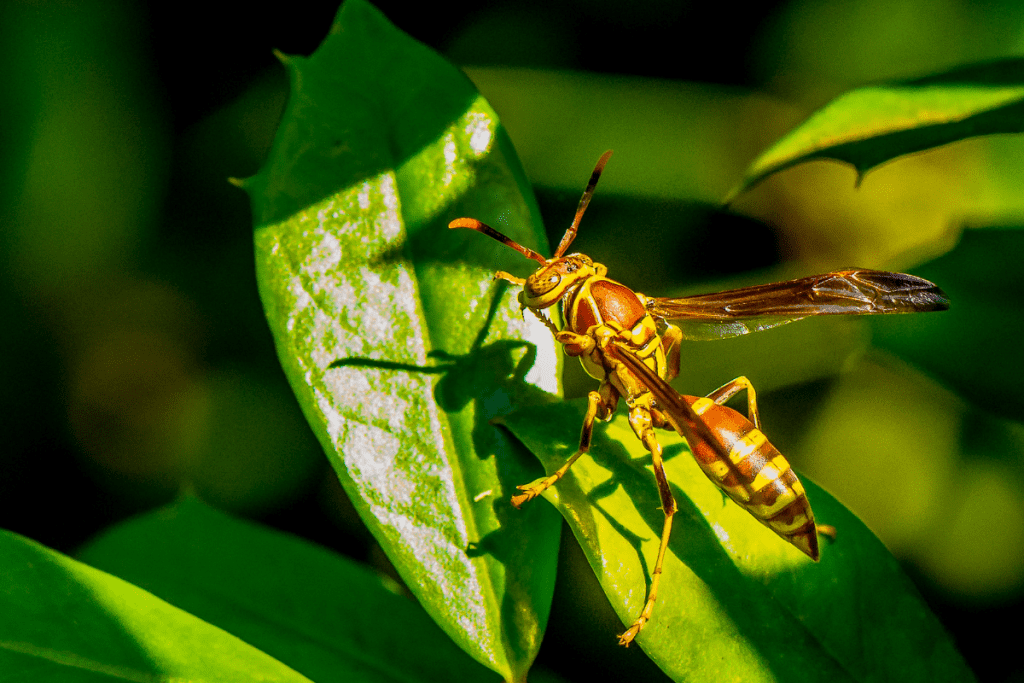Most homeowners dread mowing their lawn because wasp nests tend to build up during hot weather.
They also get angry if you disturb them while they are building their nest.
But what should you do instead?
Here’s how to keep those pesky wasps away without having to use harmful chemicals.

Table of Contents
Why Are Wasps Attracted To Your Lawn Grass
Wasps are attracted to areas where food and water are abundant.
They will also be drawn towards places with high humidity levels as well as warm temperatures.
If you notice any of these conditions around your home or yard, it may mean that wasp nests are nearby.
If you see wasps flying about near your house, they could very likely be looking for nesting sites.
As a result, the best way to prevent wasps from stinging people in your backyard is by keeping your grass cut short enough to discourage them from landing.
You can do this by trimming back your lawn’s vegetation not to grow too tall.
This will keep the area free of nectar-rich flowers, which attract insects like bees and butterflies.
It will also help reduce the amount of pollen available to pollinating insects such as bumblebees.
Therefore, when you have trimmed down your grass, you won’t need to worry about attracting wasps into your garden.
You’ll also find that fewer pests will visit your property since less food and water is available.
Why Do Wasps Sting People?
A wasp sting can be excruciating and sometimes even fatal if not treated on time.
The wasp usually bites its prey when it feels threatened or attacked so that it can defend itself from predators.
They also use their venom as a defense mechanism against other insects like ants and bees.
And speaking of ants, if you’re having trouble with mounds of dirt in your yard it could be ants or a burrowing creature.
Check out our post on how to prevent the mounds of dirt caused by different things in nature.
Tips For Avoiding Wasps While Cutting Grass
If you want to stay away from being attacked by wasps, then there are certain things that you need to keep in mind:
1. Keep your distance from the nest. If possible, try avoiding going near the area where the nest is located. It will make sure that you don’t disturb the wasps.
2. Don’t touch or pick up anything on the ground. Use gloves if necessary.
3. Avoid wearing perfume and scented products. These items may attract wasps towards you.
4. Try keeping an eye out for signs of wasps before cutting grass. For example, you might notice some small holes in trees or shrubs. Or maybe you see some dead leaves scattered all over the place. All these indicate the presence of wasps.
What If The Wasp Attacks You?
In case you get attacked by a wasp, here are some tips to help you out:
First, get away from them quickly: If possible, run away from where you got attacked.
Then, try to move towards a place where there aren’t any insects.
If you have been stung, apply ice packs immediately.
This helps reduce swelling and pain.
Try using antihistamines such as Benadryl, which reduces inflammation and itching caused due to insect bites.
Use cold compresses to relieve discomfort.
Then, apply cool water directly onto the affected areas.
Don’t scratch at the site of the attack. Instead, gently cleanse with soap and warm water.
Wasp Prevention For Your Home
Wasp-Proof Your Home
First things first, make sure your house is wasp-proofed.
This means making sure there aren’t any holes around windows, doors, vents, etc.
If you have an open window with screens, close those up too.
If you don’t want to use screen covers, put some newspaper over the opening.
Next, check under outdoor furniture and behind outdoor appliances.
Make sure no cracks exist anywhere.
Also, look into crawl spaces and attics.
Finally, seal off entry points—seal gaps between walls and floors.
Next, close up any openings in gutters and downspouts.
And eventually, cover outdoor lights with mesh caps.
Know Your Lawn
Another step to help reduce the chances of bee stings is to familiarize yourself with your yard.
This means knowing where they like to hang out.
For example, some prefer hanging around trees; others love flower beds.
Knowing what area attracts them will allow you to plan accordingly when mowing.
If possible, try to keep your grass short enough so they won’t feel comfortable nesting there.
Avoid Hives While Using Equipment
If possible, try to use electric-powered equipment when cutting grass.
This includes riding mowers, push mowers, rotary cutters, and string trimmers.
Electric power has less chance of attracting bees than gasoline engines.
However, even with electric-powered equipment, keeping some distance between yourself and the hive is still essential.
What Time Of Day Should You Mow To Avoid Wasps?
Mowing during early morning hours reduces the likelihood of encountering wasps and bees.
This is due to the fact they tend to fly higher than other times of the day.
Also, mowing after 4 pm increases the chance of finding honeybees since they tend to cluster near water sources.
So aim to mow either before 9 am or after 5 pm for the best results.
Here is our post on the optimal morning hours for mowing your lawn.
Professional Insect Services
If none of the above methods work for you, there is one last option left.
And that is hiring someone who specializes in keeping bees away from people.
A professional beekeeper has been trained on how to keep bees away from humans without harming them.
They also use special tools to help with removing honeycombs from trees and shrubs.
This helps remove the threat of swarming.
Or hire a pest control service for wasps around your home.